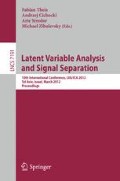Abstract
Approximate joint block diagonalization (AJBD) of a set of matrices has applications in blind source separation, e.g., when the signal mixtures contain mutually independent subspaces of dimension higher than one. The main message of this paper is that certain ordinary approximate joint diagonalization (AJD) methods (which were originally derived for “degenerate” subspaces of dimension 1) can also be used successfully for AJBD, but not all are suitable equally well. In particular, we prove that when the set is exactly jointly block-diagonalizable, perfect block-diagonalization is attainable by the recently proposed AJD algorithm “U-WEDGE” (uniformly weighted exhaustive diagonalization with Gaussian iteration) - but this basic consistency property is not shared by some other popular AJD algorithms. In addition, we show using simulation, that in the more general noisy case, the subspace identification accuracy of U-WEDGE compares favorably to competitors.
This work was supported by Ministry of Education, Youth and Sports of the Czech Republic through the project 1M0572 and by Grant Agency of the Czech Republic through the project 102/09/1278.
Access this chapter
Tax calculation will be finalised at checkout
Purchases are for personal use only
Preview
Unable to display preview. Download preview PDF.
References
Afsari, B.: Sensitivity analysis for the problem of matrix joint diagonalization. SIMAX 30(3), 1148–1171 (2008)
Afsari, B.: Simple LU and QR Based Non-orthogonal Matrix Joint Diagonalization. In: Rosca, J.P., Erdogmus, D., Príncipe, J.C., Haykin, S. (eds.) ICA 2006. LNCS, vol. 3889, pp. 1–7. Springer, Heidelberg (2006)
Abed-Meraim, K., Belouchrani, A.: Algorithms for Joint Block Diagonalization. In: Proc. of EUSIPCO 2004, Vienna, Austria, pp. 209–212 (2004)
de Lathauwer, L.: Decomposition of higher-order tensor in block terms - Part II: definitions and uniqueness. SIAM J. Matrix Anal. and Appl. 30(3), 1033–1066 (2008)
Févotte, C., Theis, F.J.: Pivot Selection Strategies in Jacobi Joint Block-Diagonalization. In: Davies, M.E., James, C.J., Abdallah, S.A., Plumbley, M.D. (eds.) ICA 2007. LNCS, vol. 4666, pp. 177–184. Springer, Heidelberg (2007)
Ghennioui, H., et al.: A Nonunitary Joint Block Diagonalization Algorithm for Blind Separation of Convolutive Mixtures of Sources. IEEE Signal Processing Letters 14(11), 860–863 (2007)
Koldovský, Z., Tichavský, P.: A Comparison of Independent Component and Independent Subspace Analysis Algorithms. In: EUSIPCO 2009, Glasgow, Scotland, April 24-28, pp. 1447–1451 (2009)
Koldovský, Z., Tichavský, P.: Time-domain blind separation of audio sources based on a complete ICA decomposition of an observation space. IEEE Tr. Audio, Speech, and Language Processing 19(2), 406–416 (2011)
Li, X.-L., Zhang, X.D.: Nonorthogonal joint diagonalization free of degenerate solutions. IEEE Tr. Signal Processing 55(5), 1803–1814 (2007)
Nion, D.: A Tensor Framework for Nonunitary Joint Block Diagonalization. IEEE Tr. Signal Processing 59(10), 4585–4594 (2011)
Pham, D.-T.: Joint approximate diagonalization of positive definite Hermitian matrices. SIAM J. Matrix Anal. and Appl. 22(4), 1136–1152 (2001)
Szabó, Z., Póczos, B., Lörincz, A.: Separation theorem for independent subspace analysis and its consequences. Pattern Recognition 45(4), 1782–1791 (2012)
Tichavský, P.: Matlab code for U-WEDGE, WEDGE, BG-WEDGE and WASOBI, http://si.utia.cas.cz/Tichavsky.html
Tichavský, P., Yeredor, A.: Fast Approximate Joint Diagonalization Incorporating Weight Matrices. IEEE Tr. Signal Processing 57(3), 878–891 (2009)
Vollgraf, R., Obermayer, K.: Quadratic optimization for simultaneous matrix diagonalization. IEEE Tr. Signal Processing 54(9), 3270–3278 (2006)
Ziehe, A., Laskov, P., Nolte, G., Müller, K.-R.: A Fast Algorithm for Joint Diagonalization with Non-orthogonal Transformations and its application to Blind Source Separation. Journal of Machine Learning Research 5, 777–800 (2004)
Author information
Authors and Affiliations
Editor information
Rights and permissions
Copyright information
© 2012 Springer-Verlag Berlin Heidelberg
About this paper
Cite this paper
Tichavský, P., Yeredor, A., Koldovský, Z. (2012). On Computation of Approximate Joint Block-Diagonalization Using Ordinary AJD. In: Theis, F., Cichocki, A., Yeredor, A., Zibulevsky, M. (eds) Latent Variable Analysis and Signal Separation. LVA/ICA 2012. Lecture Notes in Computer Science, vol 7191. Springer, Berlin, Heidelberg. https://doi.org/10.1007/978-3-642-28551-6_21
Download citation
DOI: https://doi.org/10.1007/978-3-642-28551-6_21
Publisher Name: Springer, Berlin, Heidelberg
Print ISBN: 978-3-642-28550-9
Online ISBN: 978-3-642-28551-6
eBook Packages: Computer ScienceComputer Science (R0)

